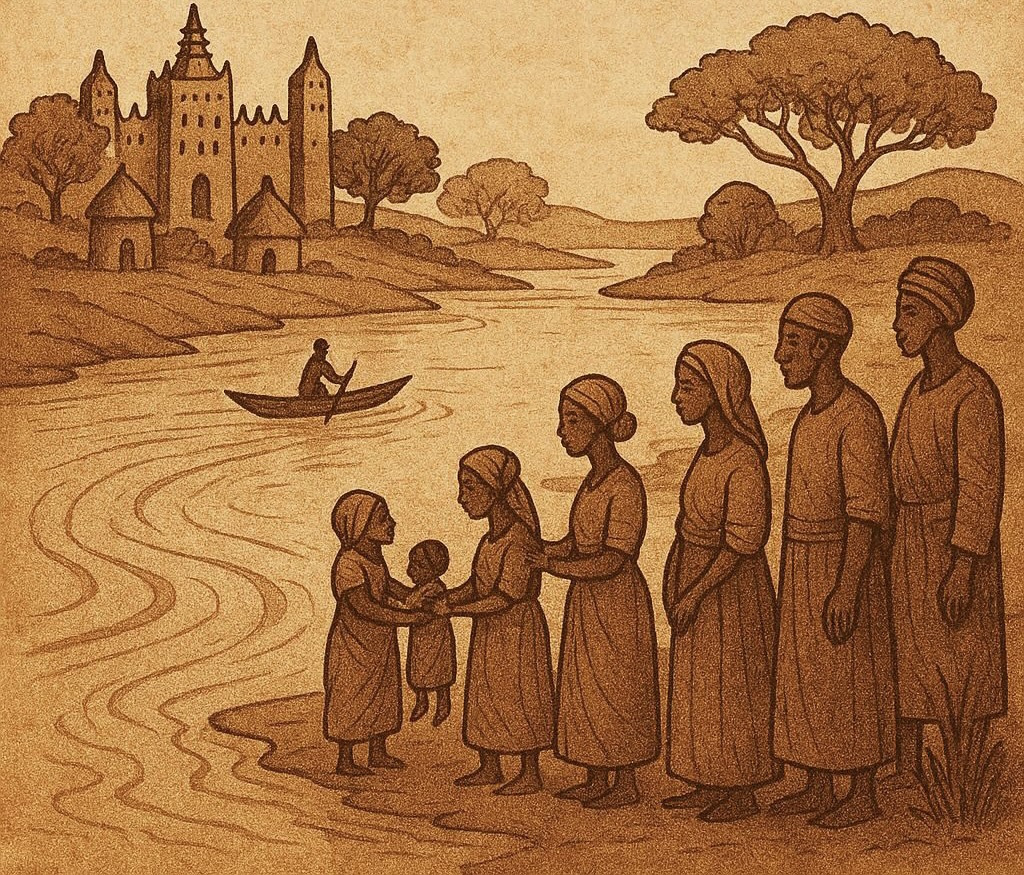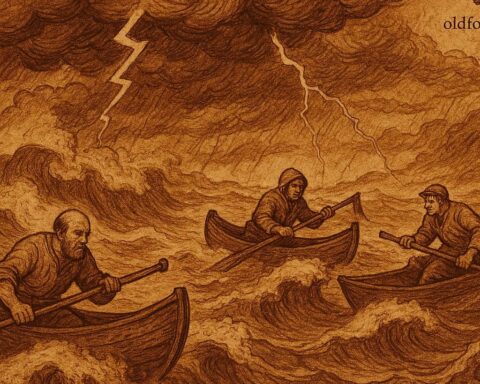Long ago, when the sun rose golden over the plains of Mali and the Niger River wound like a shining ribbon across the land, the people knew that the river was not ordinary. It was more than water. It was life itself. The river gave fish to the fishermen, fertile soil to the farmers, and water to the herders who brought their cattle to its banks. The people of the Fulani communities told their children that within the river lived a spirit, both protector and judge, who kept watch over all who depended on its waters.
The spirit was said to appear in many forms. Sometimes villagers described it as a radiant woman rising from the depths, her flowing robes made of water, her hair shimmering like the river under moonlight. Others believed it appeared as a giant serpent, its scales glistening, its eyes glowing like fireflies at night. No matter the form, all agreed that the river spirit blessed those who respected the Niger and punished those who brought harm to it.
READ THIS: The Blacksmith and the Sacred Fire
For generations, the people honored the river. At planting season, they poured libations at its banks, asking for fertile soil. At harvest, they returned to thank the waters with songs and offerings of grain. Fishermen cast the first catch of the day back into the current as a sign of gratitude. Children were taught never to throw waste into the river, for to pollute it was to insult the spirit who guarded it. Because of this respect, the land thrived. The cattle were strong, the crops were abundant, and the fish were plenty.
But as time passed, not everyone kept the old ways. Some grew careless and greedy. One season, a wealthy man from the village ignored the customs. He built a large pen for his cattle near the riverbank. Instead of leading them gently to drink, he allowed them to trample the reeds and muddy the waters. He even dumped refuse into the river, saying that the spirit was only a tale for children.
The villagers warned him. “The river gives us life. Do not anger the spirit.” But he only laughed. His herd was large, and his arrogance grew with it.
One evening, as the sun sank and painted the river red and gold, the man led his cattle to drink. Suddenly, the waters began to churn. From the depths rose a massive serpent, its body shimmering with silver scales, its eyes burning with anger. The cattle bellowed in fear, scattering from the riverbank. The man trembled as the serpent spoke in a voice that rolled like thunder.
“You have dishonored the waters that give you life. You have polluted my home and shown no respect for the gifts of the river. Now you will pay for your pride.”
Before he could flee, a whirlpool opened beneath him. The river swallowed him whole, dragging him down into its depths. His cattle fled into the night, never to return. The villagers watched in silence, their hearts heavy with fear and awe.
The next morning, the river was calm again, flowing as though nothing had happened. But the lesson remained. From that day forward, no one dared neglect the spirit of the Niger. They cleaned the banks, restored the reeds, and renewed their songs of gratitude. Children grew up hearing the tale, learning that the river was not just water but a sacred being that demanded respect.
The Fulani elders still say that the spirit watches over the Niger. Sometimes at night, when the moonlight dances on the water, villagers claim to see the figure of a woman rising gracefully from the current, or hear the hiss of a serpent moving just beneath the surface. These are reminders that the spirit is near, blessing those who live in harmony with the river and punishing those who forget its sacredness.
Moral Lesson
The story of The River Spirit of the Niger teaches that water is life, and those who respect nature will be blessed. Disrespect, greed, and pollution bring destruction. By honoring the gifts of the earth, communities live in balance, but arrogance and carelessness lead to ruin.
Knowledge Check
What role does the Niger River play in the lives of the Fulani people?
The river provides water for herders, fertile soil for farmers, and fish for fishermen, making it the source of life for the community.How was the river spirit described in the folktale?
The spirit appeared either as a radiant woman dressed in water or as a powerful serpent with shimmering scales.What customs did the villagers practice to honor the river?
They poured libations, offered the first fruits of harvest, sang songs of gratitude, and returned the first fish to the water.What disrespectful actions did the wealthy man take against the river?
He let his cattle trample the riverbanks, polluted the waters with waste, and mocked the traditions of honoring the spirit.What punishment did the river spirit give to the man who disrespected it?
The spirit rose as a serpent, created a whirlpool, and dragged the man into the depths of the river.What lasting lesson did the villagers learn from the story of the River Spirit of the Niger?
They learned that the river must be respected as sacred, and living in harmony with nature is the only way to secure blessings and avoid destruction.
Source: Fulani folktale, Mali. Oral tradition of communities along the Niger River.



